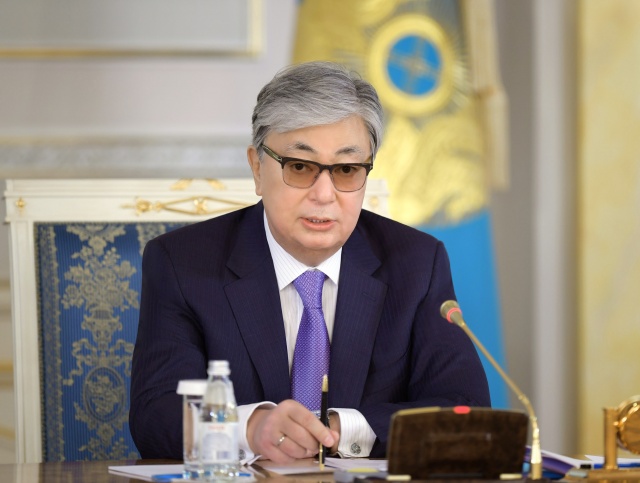‘COVID-19 has exposed our past mistakes and failures’ says Kazakhstan President
Mr. Tokayev described a “critical collapse of global cooperation” in response to the crisis, as well as a lack of mutual confidence, a misunderstanding of international competition, trade wars, and sanctions which, he said, are undermining the prospects and hopes for a better world.

The COVID-19 pandemic has been a stress test for the world, and has exposed our past mistakes and failures, Kassym-Jomart Tokayev, the President of Kazakhstan, told world leaders, during his address to the General Debate of the UN General Assembly on Wednesday.
Mr. Tokayev described a “critical collapse of global cooperation” in response to the crisis, as well as a lack of mutual confidence, a misunderstanding of international competition, trade wars, and sanctions which, he said, are undermining the prospects and hopes for a better world.
In a pre-recorded address to the Assembly’s virtual gathering of leaders, the Kazakh premier put forward a series of recommendations for dealing the pandemic at an international level.
These involved building a strong global health system; reaching a global agreement to protect global production and supply chains; increasing the World Health Organization’s capacity; and developing a network of regional centers for disease control and biosafety, as well as an international agency for biological safety, under the auspices of the UN.
Disarmament crisis
Turning to what he descried as the “looming right behind the pandemic. One of them is the nuclear non-proliferation and disarmament crisis. Kazakhstan has been the role model of a responsible state by willingly abandoning its nuclear arsenal and shutting down world’s biggest nuclear test site.
However, continuous erosion of the non-proliferation regime leaves us in a dangerous position. Kazakhstan, therefore, expects all Member States to join its appeal to nuclear powers to take necessary and urgent measures to save the humankind from a nuclear disaster.
Support for landlocked developing countries
Looking ahead to the High-Level Meeting on Financing for Development, Mr. Tokayev called for a truly global economic recovery, including an international rescue package, equivalent to 10 per cent of the world economy.
Debt repayments by the poorest countries should be suspended, he declared, noting that landlocked developing countries such as Kazakhstan have been particularly hard-hit by COVID-19, which has severely damaged trade and supply chains.
Mr. Tokayev went on to emphasize the importance of getting the UN’s 2030 Agenda for Sustainable Development back on track and, welcoming the UN Secretary-General’s decision to launch a Food Systems Summit in 2021, he said that the goal of zero hunger should be provided unconditionally.
The international community, he added, should also recommit to supporting vulnerable groups affected by the crisis, and ensure that the disruption of education does not become a generational catastrophe.
The climate opportunity
Citing examples such as the drying out of the Aral Sea, melting glaciers, and desertification, Mr. Tokayev warned that Kazakhstan is highly vulnerable to climate change, which he described as an existential crisis, on a par with the dangers posed by nuclear proliferation.
The country remains highly dependent on fossil fuels and is far from meeting its commitments under the 2015 Paris climate agreement, but is committed, said the Kazakh leader, to developing a decarbonized economy: measures include planting two billion trees over the next five years, and reducing greenhouse gases by 15 per cent by 2030.
“The post-COVID recovery gives us unique opportunity to put environmental protection at the forefront of the international agenda”, he added.
A governance challenge
These crises are all, according to Mr. Tokayev, examples of governance challenges, and demonstrate that international efforts must be accompanied by national reforms.
Kazakhstan has committed to building “an economically strong, democratically advanced and human-oriented “Listening State”, he continued, implementing several measures to achieve this aim, such as decriminalizing defamation, adopting new laws on political parties, and ensuring equal opportunities for women and youth.
Mr. Tokayev wrapped up his speech with a reminder that the current crisis contains an opportunity, to build back for a better, greener, more efficient, fair and inclusive world.